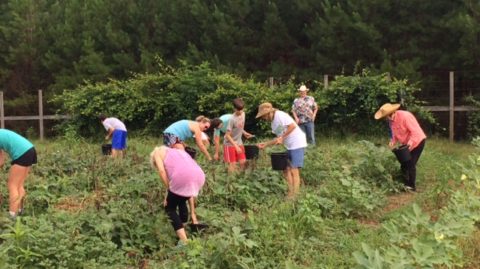Harvest Against Hunger VISTA Andrew Frank serves in the Mississippi office of Society of St. Andrew, a grassroots, faith-based gleaning network that aims to provide food-insecure individuals with healthy produce. Society of St. Andrew was founded in 1979 in Big Island, Virginia and has offices in more than eight states across the southern United States. In 2017, the Mississippi office of Society of St. Andrew gleaned more than 1.9 million pounds of produce. During the rest of 2018, the Mississippi office hopes to increase its gleaning efforts and further develop its “fresh food drives” at farmers’ markets across the state.
On an early July morning, Society of St. Andrew’s Harvest Against Hunger VISTA, Andrew Frank, pulled into the parking lot of a small Methodist church in downtown Canton, a small Mississippi town just north of Jackson. Unlike most mornings, the parking lot was filled with more than half a dozen trucks and SUVs full of volunteers. After signing waivers and stocking up with water and snacks, volunteers hopped back in their cars, ready to go. It was time for a pea pickin’ party.
Although not far from the church where the volunteers convened, the farm for the Canton Pea Pickin’ Party can be difficult to find for the uninitiated. Five minutes down a state highway, 10 minutes down an old country road, a left on a gravel road in what can only be described as the middle of nowhere, and then, suddenly, a pea patch.
Growing in green and purple pods that hang off knee-high plants, purple hull peas are a variant of the more commonly known black-eyed pea. The peas to be picked that morning had been specifically planted by Dr. Weems, the farm proprietor, under the condition that they are donated to feeding agencies.

After arriving at the farm, volunteers quickly got to work. With a bucket in hand, each volunteer began plucking up 8-inch long pods and clearing the plants. After the volunteers had harvested about half of the peas, Dr. Weems made a surprise appearance, pulling up to the patch in his mule utility vehicle to offer some words of encouragement, and remind the volunteers of the fresh watermelon awaiting them.
As anyone who has picked peas would understand, picking is only half the work. Removing the peas from their pods, or shelling the peas, is just as if not more labor intensive. Resolving to take the peas to a nearby co-op where the peas could be processed in a pea sheller on Monday, Dr. Weems and the volunteers lugged crates of peas into his air-conditioned house where they were laid on to bed sheets to avoid spoilage.
With all the work done, everyone dashed back outside to the front of the house where whole watermelons sat in containers of ice water. As it was already nearing 10 o’clock in the morning, the watermelon was quickly devoured, with stomach aches ensuing not long after.




